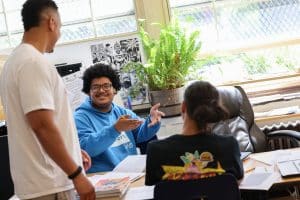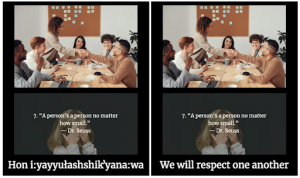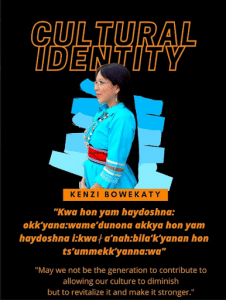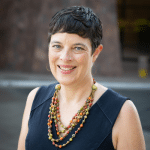Innovation in New Mexico: Capstone Projects as a Path to Better Engage Students
CompetencyWorks Blog
This capstone project post is the third in a series of posts about statewide innovation in New Mexico.
Kristen LaVolpa, a consultant with Future Focused Education in New Mexico, recalls being labeled an “at-risk” kid in high school until she discovered breakdancing and the community and sense of purpose that along came with it. This led her to value lived experience as an important source of knowledge and look for ways to incorporate student interests into formal education settings. She’s now a huge champion for capstone projects, which allow students to focus long-term attention on a personal, family, or community issue that’s important to them.
I’ve been exploring New Mexico’s evolving education system in this series, and here I’ll be looking at how capstone projects can serve as culturally and linguistically relevant learning experiences and student-centered assessments.
Capstones typically involve research, interviews, data collection, field study, and reflection over multiple drafts. They culminate in a demonstration of what the student gained and how they are ready for life after high school – which in turn demonstrates attainment of the graduate profile for a given school or district (again illustrating that elements of a CBE system are mutually reinforcing). Demonstrations can take the form of a presentation, portfolio, or creative product.
LaVolpa sees capstone projects as one of the best ways to encourage student agency: “Capstone completely shifts the student experience and mindset around what education can and should look like. Students are asked to lead their learning, which may have never happened before. This can be uncomfortable but so beneficial.” 
When created intentionally, capstone experiences can also honor cultural and linguistic diversity as well as learning diversity for students of different abilities by personalizing the support and resources based on a student’s needs and interests (the links at the end of this post offer more resources for intentionally anti-racist capstones).
Student Capstone Examples: Dropout Recovery, Social Media, and Small Businesses
New Mexico revised its high school graduation requirements in 2024. As districts design their own assessment systems, capstones are an allowable culminating assessment instead of standardized tests. However, it is New Mexico schools and communities who have been dreaming big, letting students creatively demonstrate competency and illustrating the promise of capstones as a culminating assessment.
One student at Health Leadership High School in Albuquerque set a goal of lowering the dropout rate among students of color through her capstone project. She completed a public health internship, researched race and health trends, and ultimately created a final video documentary including first-person interviews and proposed solutions to the problem. To self-evaluate the project, she measured her completion of initial goals, rates of community engagement, and ability to manage deadlines and tasks. 
A student at Robert F. Kennedy (RFK) Charter School in Albuquerque was concerned about youth suicide and anxiety rates, which they traced to excessive social media usage. The student researched healthy ways to use social media, and their final project, a multipage website, included recommendations on habits and practices to limit usage, like screen time limits and notification settings.
Another RFK student created a detailed plan for a small business selling clothing and jewelry. A culminating slide deck summarized research and findings on identifying risks, making a business plan, selecting promotional strategies, earning a profit, deciding on types of payment to accept, estimating shipping costs, and working with local banks. The presentation included reflections about the process and commitments to diversity by stocking goods from a variety of vendors and being inclusive by offering a range of clothing sizes.
Culture-Focused Group Capstones at Zuni and Cuba
Some communities have opted to offer capstone courses where the whole class identifies a topic or problem and then approaches it from different angles in smaller groups. This allows students to practice group collaboration and managing group dynamics and to complete projects that are more than any one person could complete alone. At Zuni High School, located within the Zuni Pueblo and serving the Zuni community, seniors complete group capstone projects centered around tribal sovereignty and cultural revitalization. Students present their capstone demonstrations to citizens from the Zuni community, and grading is aligned to the Zuni graduate profile (introduced in this previous post).
Students in a 2021 capstone course noticed that Zuni cultural topics existed only in the Zuni language classes, rather than throughout core content. To address this, they devised two projects. One was the Zuni Attire Construction and Design course and website, where students learned about, researched, created, and
 documented traditional garments, attire, and design. They saw the project as serving cultural and academic goals: “We noted that this application and practice of garment construction and design will not only perpetuate the sacred knowledge of our ancestors, but provide our students with the opportunity to express their creativity. Our students will also be given an opportunity to build an entrepreneurial background as an ecommerce shop will be implemented into this website as the course is developed.” The website included biographies of participating students written in Zuni language, research on the history of Zuni textiles and photographs, and explanations of garment types.
documented traditional garments, attire, and design. They saw the project as serving cultural and academic goals: “We noted that this application and practice of garment construction and design will not only perpetuate the sacred knowledge of our ancestors, but provide our students with the opportunity to express their creativity. Our students will also be given an opportunity to build an entrepreneurial background as an ecommerce shop will be implemented into this website as the course is developed.” The website included biographies of participating students written in Zuni language, research on the history of Zuni textiles and photographs, and explanations of garment types.
 Another group chose to address the lack of Zuni tradition in core classes by creating flashcards to teach, identify, and translate Zuni values. They selected key phrases, translated them, found accompanying visuals, and designed a whole deck. Students proposed card or matching games to go along with the deck.
Another group chose to address the lack of Zuni tradition in core classes by creating flashcards to teach, identify, and translate Zuni values. They selected key phrases, translated them, found accompanying visuals, and designed a whole deck. Students proposed card or matching games to go along with the deck.
In Cuba Independent School District, a village an hour north of Albuquerque, students choose between a capstone that either demonstrates bilingualism or explores a career. Recent examples include creating a bilingual poster series with portraits and quotes from prominent community members (illustrated above), an inclusion-class group-capstone building a greenhouse to grow produce for the school cafeteria, and installing a radio in a student’s car.
Building Capstone Infrastructure to Support Access

One student from Estancia High School, a rural community about an hour southeast of Albuquerque, explained: “Sometimes you really only need to meet one person outside of school to make a difference…Kids kno
w what they want but they don’t have the opportunity. We want to see better opportunities.” Expanding access to capstone experiences helps to ensure that the whole range of students – including those who have been historically underserved by our education system – can benefit. In New Mexico, nonprofit Future Focused Education leads a capstone community of practice and also funds community nonprofits to work with local schools to co-design capstone curricula and hire students for paid internships, which can count towards capstone completion.
Building educator capacity, developing resources, and leveraging community partnership infrastructure all enhance the possibility of equitable access. Just this month, Future Focused Education received a grant to develop an AI-enabled database to help students, teachers, and administrators implement capstone projects in ways that center the language, cultural, and tribal sovereignty of the communities the capstones support. Similar to the collaborative work to date, this database is being developed with and supported by a Community of Learning made up of teachers who are committed to performance-based assessments and capstones. These expanding resources and the intentionality behind the approach is creating meaningful learning experiences for the state’s young people.
Learn More
- How to Make Senior Capstones Truly Anti-Racist: Alternative Assessments Are Not Inherently Equitable Without Concerted Effort
- Framing Habits of Work and Capstone Skills in Northern Cass
- The Culmination of Mastery and Community: Senior Exhibitions at the Parker School
- Health Leadership High School: A Case Study in Innovation
Explore the Innovation in New Mexico Series
- Innovation in New Mexico: The Origins of Community-Driven, Student-Centered Systems Change
- Innovation in New Mexico: Defining Local Visions of Graduate Success
 Laurie Gagnon is the CompetencyWorks Program Director at the Aurora Institute. She leads the work of sharing promising practices shaping the future of K-12 personalized, competency-based education (CBE). Laurie lives in Somerville, MA with her partner, young son, and cat.
Laurie Gagnon is the CompetencyWorks Program Director at the Aurora Institute. She leads the work of sharing promising practices shaping the future of K-12 personalized, competency-based education (CBE). Laurie lives in Somerville, MA with her partner, young son, and cat.